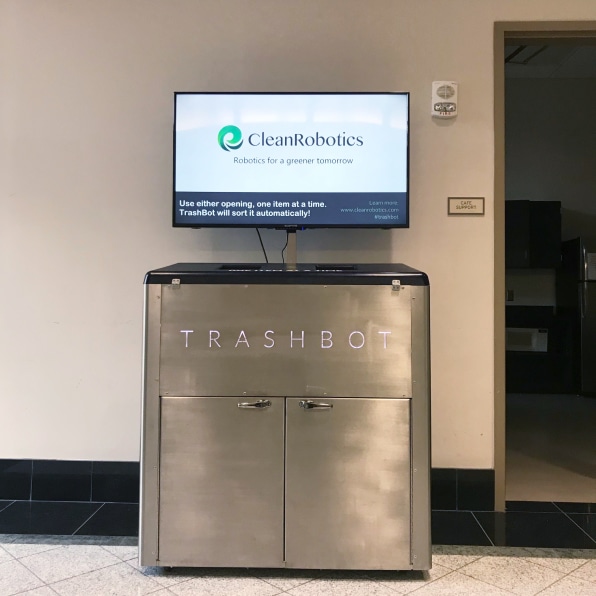This week we chatted with Zak Wehman from CleanRobotics about their solution for waste collection, and how they are thinking about the future of the sector.
Can you describe what your company does, the impact, and how it differs from other competitors in the space?
CleanRobotics is a mission driven startup that is reinventing the way we think about recycling across the globe. We are creating a robotic trash can by combining next-generation robotics and sensor technology to automatically sort recyclables from everyday trash. By deploying our TrashBots, we can achieve huge impact.
With just 2 TrashBots, we can sort 30,000 items with 90% accuracy, whereas conventional sorting is only 30% accurate. This diverts 1,800 lbs or recyclables from going to landfill, compared to 650 lbs with conventional bins. According to the EAP, for every ton of recyclables diverted, you divert a ton of carbon dioxide – 2 TrashBots can offset 5 tons of carbon dioxide, which is equal to taking one car off the road for a year. Beside carbon reductions, our TrashBots save 1,500 gallons of water each.
What sets us apart from competitors is that we collect organics and recyclables, as well as our data and analytics. We collect a granular level of data as everything is thrown away, from weight and quantity of items thrown away, and we can generate a breakdown of trash to recyclables collected.
We then take this data one step forward by providing insights that can be implemented via consumer education (at the consumer level) and procurement. By quantifying the waste, we can educate consumers and change consumer behavior around best practices to increase the recyclability of items (e.g. emptying plastic bottles).
How are you thinking about the market and policy?
There are particular markets that are really interesting to us right now – places where there exists a favorable price difference between landfill and recycling. Specifically, the East and West Cost of the US as well as Australia and Asia.
To zoom out for a second, recycling is not the most profitable thing right now. In most places, it’s cheaper to send everything to landfill.
As a result, government has stepped in, like in Los Angeles, and implemented the programs where the cost of solid waste/landfill is artificially inflated by 400-500%, making the cost differential between trash and recycling an obvious incentive for good practises. Other cities in the US will soon follow. For instance, New York City is evaluating how the model can be adapted and implemented on the East Coast (programs like this take a few years to be fully developed).
We can reduce recycling costs dramatically, especially in the upcoming years as similar types of programs grow in popularity. For stadiums, universities, and such, our breakeven point can be in less than a year.
There are a few other drivers for policy changes. In countries with limited land, like in the Caribbean and Australia, landfill rates have spiked, as they don’t have enough space. People are also sick and tired of having plastic wash up on their beaches and are strongly pressuring CPG companies/producers to take responsibility. Zero waste goals are another motivating factor.
One other piece to consider is that if contaminated recyclables are sent to recycling facilities, business get charged. One of the big contenders here are airports. Because transitory consumers that don’t know how to sort their own waste according to local rules, airports end up sending their recycling to landfill, so that they aren’t penalized.
What does the future look like?
The future looks bright.
The current pandemic has been a huge wake up call for many people that a habitable planet has limitations. There has also been a massive uptick in adoption from corporates for green and sustainable technology. As an example, I saw a McKinsey report that says that 65% of consumers consider the entire lifecycle of the goods they buy.
However, there’s a lot of work to do in order to cross the finish line. Many of these solutions are hardware based, so it’s not going to be as fast as a SaaS company that’s going to kind of pop up overnight and be fully commercialized in a few years. It will take time and a combination of solutions to solve our trash problem.
Our Outlook
CleanRobotics is changing the waste management game when trash is thrown out. Not only does CleanRobotics sort items more accurately at waste receptacles, but CleanRobotics also works on educating consumers. Their innovation will make a difference right away, specifically on sorting facilities, recycling programs, and landfills. The second change, that will take time, is that as they educate consumers (and producers), we will start to see more eco-friendly packaging.
About The Author

Daniel currently works at Lawrence Livermore National Laboratory. His original assignment was to maintain and update facility safety documentation for all facilities on-site, and perform risk analysis. Over time, his role has expanded to leading continuous improvement efforts through product management.
Concurrently, Daniel volunteers with Techstars, helping organize startup weekends, and with the American Institute of Chemical Engineers, organizing events on the local and national levels of the organization. He also volunteers with One World, and previously with Powerhouse Ventures, to source and screen startups for potential investment.
Daniel holds a BS in Chemical Engineering from UC Davis, and recently completed coursework in energy innovation from Stanford. His passion is at the intersection of sustainability, innovation, and business.

